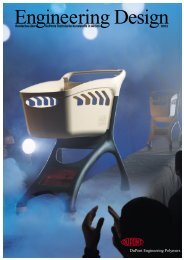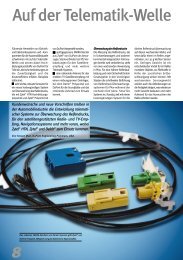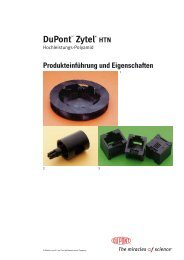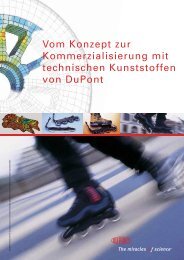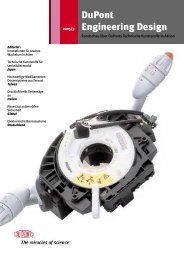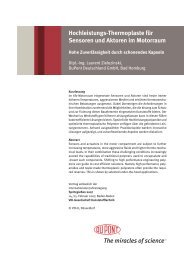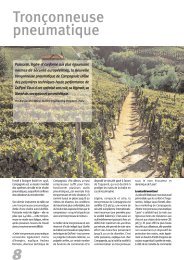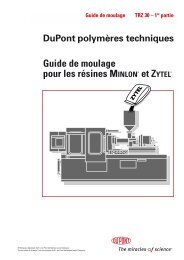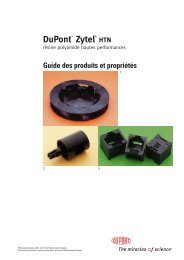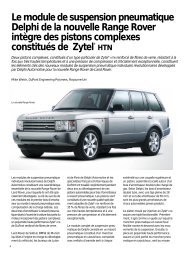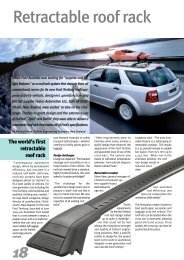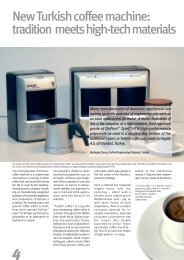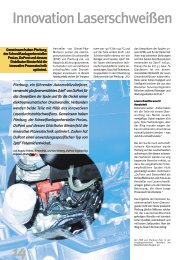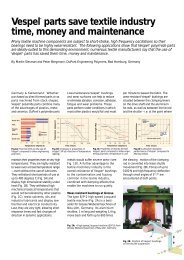General Design Principles for DuPont Engineering Polymers - Module
General Design Principles for DuPont Engineering Polymers - Module
General Design Principles for DuPont Engineering Polymers - Module
You also want an ePaper? Increase the reach of your titles
YUMPU automatically turns print PDFs into web optimized ePapers that Google loves.
7—Bearings<br />
Bearings and bushings of Zytel ® nylon resin and<br />
Delrin ® acetal resin are used in numerous commercial<br />
applications. Zytel ® is uniquely suited to abrasive<br />
atmospheres such as in cement plants and in factories<br />
where dust is a constant problem. Bearings of Zytel ®<br />
have been used successfully under diverse environmental<br />
conditions including the presence of various<br />
oils, greases, chemicals, reagents and proprietary<br />
compositions, many of which are harmful to other<br />
types of plastic materials.<br />
Bearings of Delrin ® acetal resin offer the unique<br />
characteristic of no “Slip-stick,” or the static friction<br />
coefficient being equal or lower than dynamic.<br />
Typical applications are hemispherical bearings <strong>for</strong><br />
auto ball-joints; food mixer housing-bearing combinations;<br />
wear surfaces on integral gear-spring-cam units<br />
<strong>for</strong> calculators; clock bushings and many others. The<br />
extensive use of Delrin ® acetal resin as a bearing<br />
material has developed because of its combination of<br />
low coefficient of friction with self-lubricating<br />
properties, good mechanical properties and dimensional<br />
stability in many chemical media.<br />
The per<strong>for</strong>mance of bearings depends on a number of<br />
factors.<br />
Shaft Hardness and Finish<br />
If a metal shaft runs in a bearing of Delrin ® acetal<br />
resin or Zytel ® nylon resin, the most important parameter<br />
is the surface hardness of the shaft. For unlubricated<br />
bearings of Delrin ® acetal resin or Zytel ® nylon<br />
resin on metal, the metal should be as hard and<br />
smooth as consistent with bearing-life requirements<br />
and bearing cost. Common centerless ground shafts of<br />
steel are acceptable, but increased hardness and finish<br />
Figure 7.01 Wear of Delrin ® 500 against various materials*<br />
Wear<br />
Delrin ®<br />
Mild Steel<br />
Delrin ®<br />
1 2 3<br />
Hard Steel<br />
Time of Test<br />
39<br />
will improve bearing life. At one set of test conditions*<br />
a steel shaft of R60 hardness and 4 μin (AA) finish<br />
should extend bearing life twofold relative to a shaft<br />
of R22, 16 μin (AA).<br />
The actual wear per<strong>for</strong>mance will change with<br />
the speed and load and the type of mating surface<br />
material.<br />
Soft steel or stainless steel, as well as all nonferrous<br />
metals, do not run well with plastic bearings, even<br />
those with a so-called “self-lubricating” filler. It is<br />
only a question of load, speed and time until wear<br />
increases rapidly, leading to premature failure. Shaft<br />
hardness becomes more important with higher PV<br />
values and/or the expected service life. A highly<br />
polished surface does not improve wear behavior if<br />
the hardness is insufficient.<br />
There are nevertheless a great number of bearing<br />
applications which per<strong>for</strong>m satisfactorily against soft<br />
metals running at low speed and load, such as bearings<br />
<strong>for</strong> clocks and counter mechanisms. Delrin ® acetal<br />
resin generally per<strong>for</strong>ms better than other plastics<br />
against soft metals. If a bearing fails, it is, however,<br />
most important to carefully check the hardness of the<br />
metal shaft surface since it may account partially <strong>for</strong><br />
unsatisfactory per<strong>for</strong>mance.<br />
Bearing Surface<br />
The influence of mating surface on wear rate between<br />
Delrin ® acetal resin and various materials is shown in<br />
Figure 7.01. A dramatic reduction in wear can be seen<br />
as material hardness increases between curves 1, 2 and<br />
3. The most dramatic differences can be seen in curve<br />
4 where Delrin ® acetal resin is matched with Zytel ®<br />
101 nylon.<br />
*Thrust washer test non-lubricated; P, 2 MPa (300 psi) V, 50 mm/s<br />
(10 fpm), AISI 1080 carbon steel.<br />
Delrin ®<br />
Tungsten<br />
Carbide<br />
5<br />
Delrin ® Hard Steel<br />
with slots<br />
Delrin ® —Zytel ® 101<br />
4



